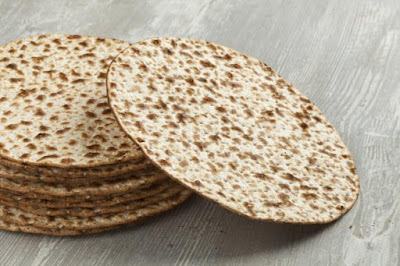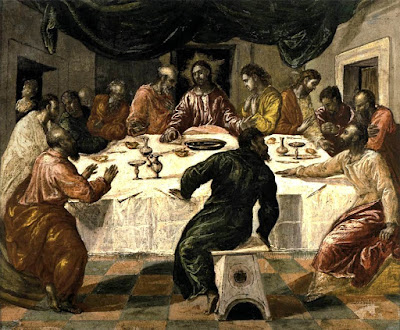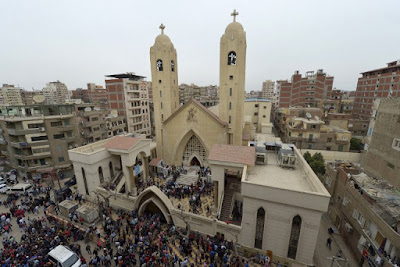“The Lord said to Moses and
Aaron in the land of Egypt: this month shall mark for you the beginning of
months; it shall be the first month of the year for you” (Exodus 12:1-2)
It
must take a lot to start time over. It
must take an event so big, so significant, so meaningful to begin an entirely new and different calendar.
I
know that each year in about July, our office administrator, Hanne, orders new daily planners for all the
staff. It’s a little strange and yet
invigorating to be thinking about
what might happen past January of the next year when we’re still in the middle of the current one, to look ahead
and see all of those blank white squares advancing
into the future, ready for action, but
that’s not even what’s happening here for
the people of Israel. God isn’t just
ordering them next year’s daily planner. God
is marking a brand new set of months for them. This is a new beginning of time itself, like they’re starting over at zero.
And
it was new in both of the ways people counted time back then—the movement of
the moon and the movement of the sun. The
sun was the way yearly time was marked and
the moon, with its easily discernible phases each night, was how monthly time was marked. Therefore this moment they find themselves in is not just the beginning of a new month, but a whole new year. Everything, therefore, is starting anew. All that came before is a different
era, and this is the moment that
begins it all.
It
is certainly is significant, by all accounts. They are being set free from a life of slavery in Egypt. They are being released from a life as
no people at all, a life at the
bottom of society, which is all that they had every known. God has heard their cry and, in his grace, God is going to make a way for them to live a new life. God is going to give them a name and a
home and restore them to their proper
place as his holy people, shining in
the world. From now on, no matter how
many new daily planners they buy, the
progress of time will be marked from this point, the moment they were freed.
 |
| unleavened bread, a Passover staple |
And
each year when the anniversary of this event is remembered, the people of God and their descendants will gather like they did that first time when they were commanded by Moses and Aaron. They will slaughter a lamb like they did back then and they will eat bread made without
any yeast because there was no time for it to rise. They will remember how they ate with their traveling clothes on and sandals on their feet because they were in a hurry. Time was starting over. Is was the Passover of the Lord. In fact, Rabbi Gamaliel, a teacher of
great authority who was alive at the time of Jesus, is reported to have said about celebrating the Passover, “In every generation a man must so
regard himself as if he himself came
forth out of Egypt.”[1]
This
was the meal that Jesus gathered his disciples for on his last evening. We have come to call it the Last
Supper, his last time with his
disciples for teaching and sharing fellowship. Even Jesus was certainly aware that time for him was winding down. And tonight, once we celebrate this
supper, we will conclude with the
stripping of the altar, a powerful
ritual that certainly feels like a bitter end.
 |
| "The Last Supper" (El Greco, 1568) |
To
some degree, all of this is true, all of these “lasts.” Jesus is about to hand
over his life and there is an air of
finality hanging in around tonight. However,
it is important to remember that this
was still mainly a meal about beginnings,
about time starting over again, about
countless blank white squares laid out into the future before the people of God.
On
some level, that’s what would have
been going through the disciples’ minds as
they sat around that table with Jesus. They
would have been thinking about the bread baked quickly, the blood spread over the door.
And they would have been thinking about those sandaled feet, ready to run out the door and into that
new freedom.
So
when in the middle of all this Jesus gets up and begins washing feet, they realize something profound must be
going on. Those are feet that should
be dirty—and that’s OK! They are supposed to be ready to travel! As he takes
those feet in his hands, maybe even untying the sandals, Jesus slows them down, and
prepares them for a new kind of freedom, a new kind of life. In washing their feet that evening
during the Passover celebration, Jesus
gives his disciples a new vision for what following God will entail and a bold new definition for what
freedom in his name will look like. It
will entail acts of humility and servanthood
in ways that build up community. It
will look like stooping down at the feet of others, tending with kindness and care
to the lowlier, more neglected aspects of their lives. And perhaps the part that shocks us most: those who normally have
authority and who are in positions of
control and expertise take on
thankless tasks of love.
So,
in the middle of a meal that is all about remembering who they are Jesus sets this lesson about how they
relate to each other will be their true identifying marker. In the midst of an event that is about new beginnings, Jesus hands them a new commandment. And in the middle of a celebration that is based on people from the very
bottom of society finally being lifted up,
Jesus goes from the place of authority
down to the floor.
What
he’s doing is starting time over. He’s
giving them a brand new beginning. And
he’s going to do it by offering his body and shedding his own blood.
This
is the meal that he shares with his disciples, the meal that Christ shares with us tonight. It may be his last Supper, but for us it is a time to start anew, just as it is every time we eat of his
body and drink of his blood. He makes
it his end so that we can have new beginnings. Each time we share this meal,
each time we digest his words, we
know his forgiveness for us. We are
set free, we begin anew, as if time starts over for our soul, for our feet, for our life. We get a new calendar, full of blank squares to live. But because it is also a time for us to
remember our identity as servants of
the Servant Lord, it means we don’t
just run out into the world, filling
those blank squares with whatever we want.
We now have a freedom to serve others,
to love one another like Christ has loved us.
As
you know, the world will always present us
with plenty of opportunities to
practice this new covenant and live this new freedom these days. It seems like the stakes are being
raised these days, though. Many of you may have heard of the bombings in Coptic
Churches in Egypt this past weekend as
worshippers were gathered for Palm Sunday.
Terrorists made their way into the congregation and detonated bombs while the Christians were worshipping. Nearly 50 died and many more were
wounded in what would be their last
worship service on earth. I’ve read
that several of the congregations in middle Egypt, where there are higher percentages of Christians amidst the predominantly Muslim
population, are still going to gather for Easter services this weekend, but they are scaling them back out of
respect for the dead.
 |
| Mar Girgis (St. George) Coptic Church in Tanta, Egypt, site of one of the Palm Sunday 2017 bombings |
I’m
sure it must be unbelievably difficult to
know how to forge ahead in the wake of such despicable tragedy and evil. I do
not purport to be an expert in it. I think
it would be easy to give into hatred and anger and violence, or, better yet, apathy and denial of
that Christian identity. Yet the
Copts are coming out in droves to
show their love and support for each other,
surely a strong witness of this new commandment Jesus gives. In a sermon called, “A Message to Those
Who Killed us,” delivered earlier
this week, one Coptic priest, Father Boules George, took the opportunity to preach directly to those who carried out
the bombings and to those who might
be planning more. Instead of anger or
despair, he preached thanksgiving and love.
He says at one point to the murderers,
“thanks for refilling our churches for us.” Normally on the Monday of Holy week the attendance is very low, but this week they were there by the
thousands. He says every nook and
cranny of the churches were filled with worshippers. People they’ve begged for years to come to church were there. He also preached about love. He says at one point, “I want to explain
to you about our Christ. I want to
tell you about how wonderful He is.”[2]
As
I read the sermon I realized these must be words from someone who has shared supper with a Lord who has set him
free. It is the witness of someone
with washed feet—washed and sandaled—cleansed, ready to go out into the world and
live this new beginning of love. Since
the first time this meal was celebrated with Jesus, the enemies of God have circled around with crosses, spears, and suicide bombing jackets with the intent to intimidate and
eradicate his followers. However, all
those different enemies have come and gone,
appearing and then eventually disappearing into the shadows of history without ever altering our message.
That
is life in our new calendar. The community of this meal and its Host remains, growing, beating with the heartbeat of
forgiveness, through all eras of time—through
countless blank, open squares of countless calendars. Today, he beckons you and me…and Samuel, and Krista and Clare and
Patrick and Fiona…again to take the
bread and the cup, to begin again the
journey of freedom and service.
With
broken body and blood that is shed, he wants to explain to you about himself.
Taste
and see how wonderful he is.
Amen.
The Reverend Phillip W.
Martin, Jr.



No comments:
Post a Comment